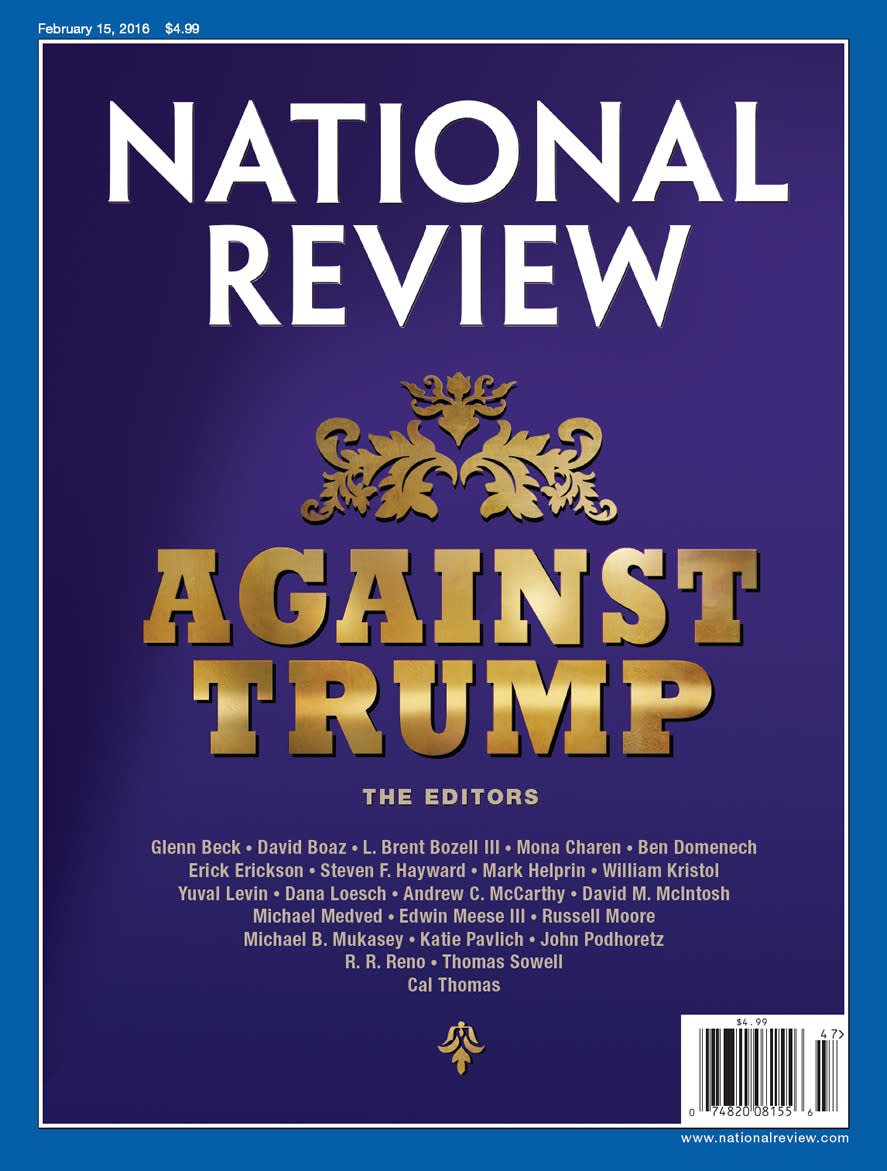Conservatives unite to condemn Donald Trump as a ‘menace’

The magazine that helped to start the modern conservative movement in the 1950s, National Review, planted itself firmly in opposition to Donald Trump’s presidential candidacy Thursday.
“Against Trump,” the magazine placed on its cover in large gold letters designed to mockingly imitate Trump’s own personal branding of his business empire. Inside, the publication’s editors condemned the real estate mogul and reality TV star as a “philosophically unmoored political opportunist who would trash the broad conservative ideological consensus within the GOP in favor of a free-floating populism with strong-man overtones.”
“Trump is a menace to American conservatism who would take the work of generations and trample it underfoot in behalf of a populism as heedless and crude as the Donald himself,” the magazine declared.
National Review also collected essays from 22 conservative leaders who offered their own reasons for opposing Trump’s candidacy. The names ranged from former Fox News star Glenn Beck to former Attorneys General Edwin Meese and Michael Mukasey to prominent Southern Baptist leader Russell Moore to online provocateur Erick Erickson, the founder of the conservative blog RedState.
The magazine’s dramatic move comes as Trump has regained the lead in polling in Iowa, which carries enormous influence as the first state to vote in the primary process.
National Review’s complaints against Trump ranged from his liberal positions in the past on abortion, gun control, health care and taxes to what it deemed to be his lack of knowledge of the details of his own immigration plan.
“In one Republican debate he clearly had no idea what’s in that plan and advocated increased legal immigration, which is completely at odds with it,” the magazine’s editors wrote.
National Review is very hawkish on the immigration issue itself, generally favoring reducing legal immigration in addition to illegal immigration. It stated in its editorial that Mitt Romney’s support for “self-deportation” as the Republican nominee in 2012 was “entirely reasonable,” and noted that at the time, Trump criticized Romney over it.
The magazine’s outburst quickly drew the ire of the Republic National Committee, which revoked National Review’s partner status in a Feb. 25 debate of GOP presidential candidates.
The Review stood by its stance after the RNC’s move.
“We expected this was coming. Small price to pay for speaking the truth about The Donald,” the Review publisher wrote Friday in a blog post.
A theme throughout the magazine’s editorial and many of the essays is that Trump presents himself as a “strong man” to fix the nation’s problems, whereas conservatives believe that power should be as decentralized as possible. “No one can be fully trusted with public power, and self-government in a free society demands that we reject the siren song of politics-as-management,” wrote Yuval Levin, editor of the conservative journal National Affairs.
Trump “has a lot more in common with South American populist demagogues than with our tradition of political leaders,” wrote R.R. Reno, editor of the conservative religious journal First Things.
If he becomes the Republican nominee, he “would be, unquestionably, the worst thing to happen to the American common culture in my lifetime,” wrote John Podhoretz, editor of Commentary magazine.
Moore wrote that Trump would undermine religious conservatives’ positions on three of their most important issues: abortion, marriage and religious liberty.
And Bill Kristol, editor of the Weekly Standard, the conservative movement’s most well-known magazine besides National Review, summoned the trademark saying of National Review’s founder, William F. Buckley. Buckley wrote in his 1955 mission statement for the magazine that it “stands athwart history, yelling Stop, at a time when no one is inclined to do so, or to have much patience with those who so urge it.”
Kristol quoted a letter from philosopher Leo Strauss to National Review, in which Strauss said that “a conservative, I take it, is a man who despises vulgarity.”
“But the argument which is concerned exclusively with calculations of success, and is based on blindness to the nobility of the effort, is vulgar,” Strauss wrote.
Kristol continued: “Isn’t Donald Trump the very epitome of vulgarity? In sum: Isn’t Trumpism a two-bit Caesarism of a kind that American conservatives have always disdained? Isn’t the task of conservatives today to stand athwart Trumpism, yelling Stop?”
Trump responded quickly in his usual fashion: on Twitter, with insults that ignored the substance of the criticism against him.


